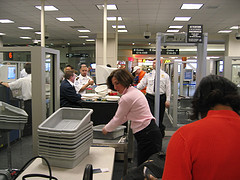
The TSA has been taking an enormous beating this past week over the new enhanced security measures. Whether you believe all the sordid tales of naked pictures, groped breasts, and fondled genitalia are the unfortunate exceptional case we endure for our safety, or the overreaching rule of a government agency overstepping its authority, let’s at least take a moment to feel pity for the TSA agents themselves.
These hard working front-line employees not only need to deal with the irate and discourteous among us, but they are condemned to spend eight hours a day staring at bad pictures of naked fat people, and running their hands up and down our cottage cheese laden thighs. It’s a small wonder the suicide rate for TSA employees hasn’t gone through the roof. If there’s blame to lay here, it’s on the Homeland Security policy that created this mess. Not the poor people who are stuck implementing it.
There are a lot of valid questions about the safety of the backscatter and millimeter wave scanners, and many more about the efficacy of the scanning technology at preventing terror attacks. Yet the major unanswered question is, does this sort of scanning technology violate our fourth amendment rights. The Fourth Amendment assures us a right to a reasonable expectation of privacy. As I’ve written about before (here and here), the laws defining how new technology can and cannot be used in the context of the Fourth Amendment are decades behind the engineering work.
The current TSA situation makes it clear the so-called naked scanners are the equivalent of searching your clothes, pockets, and body. Something courts have historically ruled cannot be done without probable cause. That technology enables the search to be conducted at a distance doesn’t make it less an invasion of privacy.
If you were walking down the street minding your own business and a cop pulled up and told you to empty your pockets and submit to a full pat down, you’d have a lawyer and a lawsuit filed before he got on his latex gloves. It shouldn’t be a different case if he had a portable scanner that accomplished the same purpose without actually touching you or even stopping you. The time to decide the legality of these issues is now, before the handheld scanners are developed and deployed.
Although, even with the existing scanners, we are copping to probable cause based solely on the evidence that we purchased a ticket for Toledo. Would such scanners be as easily accepted in bus stations, movie theaters, or shopping malls? Probably not. Clearly airports are different. We willingly give up rights in airports we would not allow to be infringed anywhere else.
The reason being that collectively we have an irrational fear of terrorists. It’s not that terrorists don’t warrant our vigilance and attention, but the size of the fear is irrational. The 9/11 attacks have forever bound airplanes and terrorism together, and it is often argued that we simply have to give up some of our rights at airports in order to be safe. But we don’t actually live like we believe that.
Over the last decade, terrorists have killed about 3000 Americans on or with airplanes—almost all of them on one day. Meanwhile, according to the CDC, there are over 30,000 deaths each year caused by firearms. That’s 300,000 people over that same decade. For scale, that’s about the same as a medium size city or half the population of the entire state of Alaska. While outlawing guns would clearly not have saved all those people, if there were no guns many tens of thousands of them would undoubtedly be alive today. Yet we would never remotely consider a gun ban. This clearly isn’t a rational decision based on preserving our actual safety and well being.
The point is, we accept some level of risk every day. It’s not completely safe to drive to the supermarket, and it’s certainly not safe to be around Dick Cheney when he’s got a loaded gun. But we take those risks anyway. Sure, we drive cars with airbags and buckle our seatbelts. We try not wander into urban gang territory at night wearing spandex and singing show tunes. We lock our doors, but we don’t bar them and hire perimeter guards to walk the yard at night. We take reasonable, but not oppressive precautions. There’s no reason airports can’t be handled the same way.
Yes, I’d just as soon the guy sitting next to me on the plane wasn’t packing heat. But I can live with him having nail clippers, a pocket knife, and 5oz of shampoo. And yes, that leaves open the possibility that he has a rectum full of C4 and the cool disposition to detonate it. Although the TSA scanners wouldn’t have picked that up anyway, so at least I’d have gotten to spend more time at home before the flight rather than waiting in line for a security inspection.
